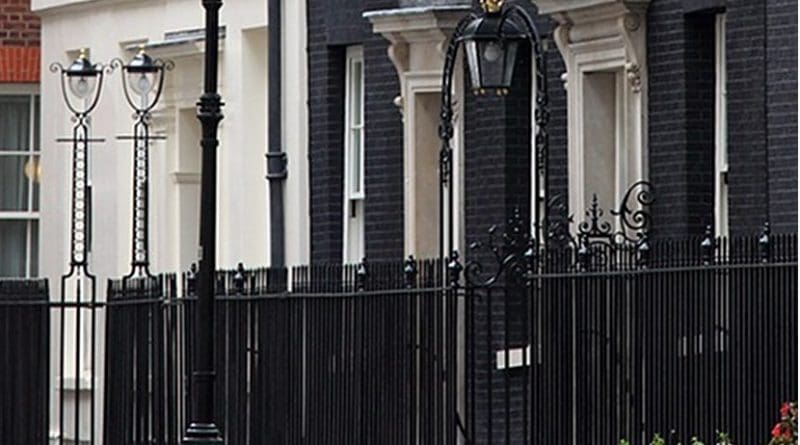Conservative Leadership Contest In UK Has An ‘Alice In Wonderland’ Feel To It – OpEd
By Arab News
By Andrew Hammond
Conservative MPs in the UK on Wednesday selected their final two candidates to replace Boris Johnson as prime minister, in a contest that increasingly has an “Alice in Wonderland” fantasy quality to it.
Foreign Secretary Liz Truss was a Remain campaigner during the 2016 Brexit referendum but has since moved to the party’s right wing and is seen as a continuity candidate by Johnson’s supporters.
Her opponent is Rishi Sunak, a former finance minister and a long-time Brexiteer who was once Johnson’s closest ally but is now facing criticism from some Conservatives, especially friends of Johnson, for being too “left wing.”
There are two phases to the Conservative leadership contest. During the first, now completed, the party’s MPs voted to choose two candidates, from the 11 who were standing, to progress to the second and final stage. In the vote on Wednesday, Sunak received 137 votes and Truss, 113. Trade Minister Penny Mordaunt, with 105 votes, performed best among the others who were eliminated.
Now, all of the party’s members, of which there are about 200,000, will vote for their choice of new leader, with the winner of the postal ballot due to be announced on Sept. 5. These party members, which account for about 0.3 percent of the UK population, are disproportionately old (44 percent of them are over 65), white (97 percent), and geographically skewed toward London and southern England (54 percent), so they are not very representative of the wider UK population.
Unlike in 2019, when Johnson was the clear favorite to win the Conservative leadership contest from start to finish, there is no overwhelmingly strong frontrunner this time. While Sunak won the most support in the vote by Conservative MPs, polls suggest he could lose to Truss when the wider party membership votes.
However, the result is considered too close to call. At this early stage, Truss is a modest favorite but Sunak could definitely still emerge victorious in the coming weeks if he can outshine her in the upcoming leadership debates, known as hustings, around the country.
With Wednesday’s vote revealing Conservative MPs to be split into three broadly equal groups, Sunak and Truss will now try to secure an endorsement from third-placed Mordaunt, a vote of approval that could prove to be very influential among party members. In return, Mordaunt is likely to receive a significant Cabinet role in the next government if she backs the eventual winner.
So far, the leadership contest has hurt the national image of the Conservatives as a result of significant party infighting. Meanwhile, the opposition Labour Party will be relieved that an “outsider” such as Mordaunt has not been selected, as such a candidate would perhaps have had more of a chance to “shake up” the political landscape in a way that Truss and Sunak, as established, senior Cabinet ministers for the past few years, might not be able to.
Labour has also been adding up the cost of the policy pledges made by the Conservative leadership candidates and claims that they amount to £330 billion ($395 billion) of unfunded spending commitments. This includes an estimated £38 billion of tax cuts Truss has promised to introduce if she wins, including the reversal of an increase in corporation tax due next April, estimated at £14.5 billion.
It is too early to assess the full policy implications of the leadership contest, which will not start to become clearer until at least next month. Tax will be one of them, however. While Sunak favors fiscal prudence, Truss has said she wants early, significant personal tax cuts, including the scrapping of a rise in National Insurance planned for April, which was introduced by the government while Sunak was still at the Treasury.
Sunak has rubbished her proposals, saying that tax rises are needed to repair public finances after the pandemic and accusing Truss of peddling the idea of “something-for-nothing economics.” He has said he wants to lower the tax burden but this should only be done when inflation, which is currently running at its highest level for 40 years, has been brought under control.
Ultimately, party members will take a long, hard look at both candidates and decide which of them seems best placed to beat Labour at the next election. Truss lacks charisma and is widely seen as “robotic,” as was Johnson’s predecessor as prime minister, Theresa May.
Sunak, like Johnson, was recently fined by police over the Downing Street “partygate” scandal resulting from illegal social gatherings during COVID-19 lockdowns, so his reputation is tarnished in the eyes of some voters. He also was recently criticized over the tax affairs of his wife, Akshata Murty, the daughter of Indian billionaire N.R. Narayana Murthy. The couple met while studying at Stanford University.
Neither Truss nor Sunak seems likely to achieve the electoral success Johnson enjoyed in 2019. Therefore, the Conservatives have a very tough choice to make in coming weeks, as the person they choose will almost certainly lead the party into the next general election in 2023 or 2024.
• Andrew Hammond is an associate at LSE IDEAS at the London School of Economics

